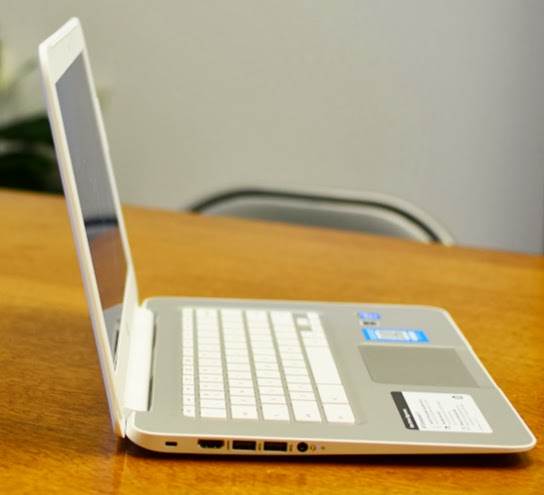A new laptop developed jointly by HP and Google is targeting the segment of the market previously dominated by Apple’s MacBook Air. The HP Chromebook 13, at least in some iterations, is the first model in that line to use one of Intel’s Core m Skylake processors.
The Chromebook 13 has a 13.3-inch display available with “either full HD or a pixel-packed 3200 x 1800 (QHD+) resolution,” the company said. Introduced by Google today, the new Chromebook can be configured with up to 16 GB of RAM.
The new model has 802.11ac dual-band wireless, 32 GB of storage, a webcam, headphone jack, a microSD card reader and integrated Intel HD 515 graphics. It measures just over half an inch thick (12.9mm) and weighs 2.86 pounds. The MacBook Air is 17mm thick and weighs 2.96 pounds.
The Chromebook 13 also comes with an Elite USB-C Docking Station for charging and connecting the machine to up to two displays, external storage drives and other peripherals. The Core m is also said to provide 11.5 hours of battery life, about the same as that of the MacBook.
Stuck With Chrome OS
The new Chromebook is priced starting at $ 499 and is set go on sale by the end of the month. While it’s more expensive than other starter laptops from such competitors as Acer and Lenovo, HP and Google are hoping its advanced features, such as multi-layered security, including automatic updates, sandboxing, verified boot, data encryption and recovery, will be enticing enough to make up for its higher price.
But is all that enough for the average home users, let alone business users? Possibly not, unless those business users are OK with running the Google productivity suite. Even so, past Chromebooks have caught on better in the education market than in the business sector.
Jan Dawson, chief analyst at Jackdaw Research, told us that as with other Chromebooks, buyers will have to overlook flaws and idiosyncrasies if they’re to get on board.
Better for Education?
“The design is better than most cheaper Chromebooks, though there are still some funny quirks, like the hinge at the back,” said Dawson. “The specs are really solid, but it’s still inherently a Chromebook, which always has limitations. In that sense, the glaring omission would be a proper operating system.”
Chromebooks are totally fine if people don’t need desktop apps like Office, PhotoShop or more specialized enterprise applications, he said. And that’s certainly fine for some employees in some companies, especially those who have already committed to the Google productivity suite, he added.
“But there’s a reason Chromebooks have done better in education and less well among businesses — most businesses still want to know that they can run their traditional software on these devices.”
Image Credit: HP Chromebook 13 via Google.







